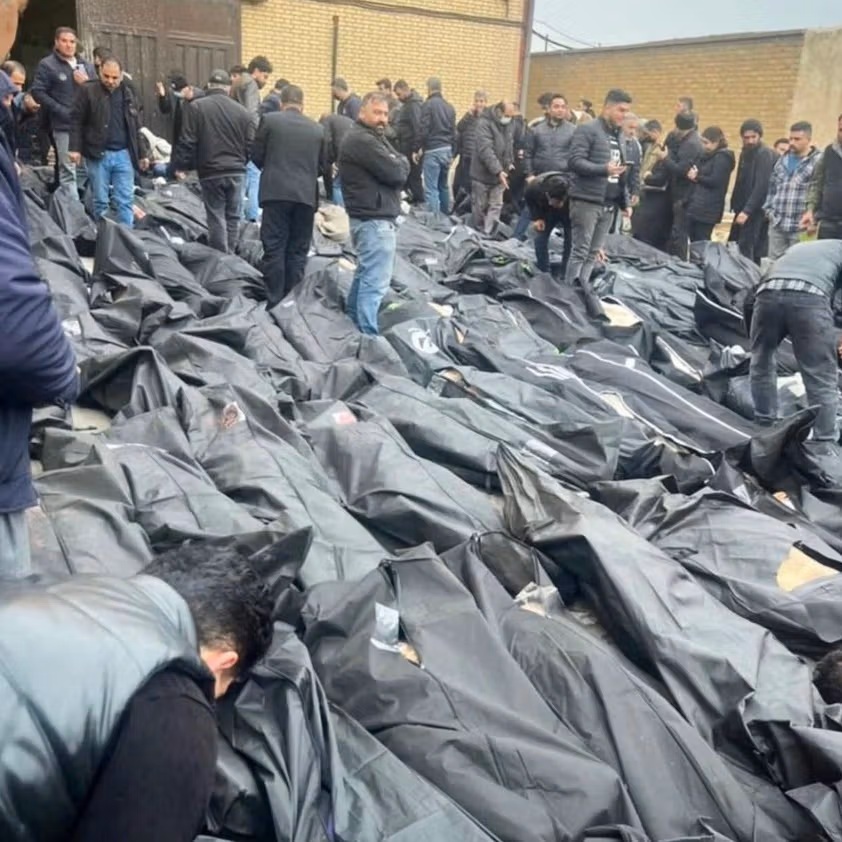
It is not easy being Lebanese these days if it ever was. Surrounded by unfriendly neighbours, a completely collapsed economy, a never-ending political stalemate, and now a new round of war. Planned years in advance. It is not just Lebanon or Palestine that is suffering foreign aggression; in less than 20 years, the whole Middle East has been systematically destroyed. What is going on?
By Arthur Blok
If there is one common denominator between Lebanese, it is their unconditional love for their country. At the same time, the Lebanese are ashamed and angry at the state of their nation. No matter how often they go to the polls, they are stuck with the same mediocre, incompetent political elite that has led the country into destruction: useful idiots who only serve their agenda.
Lebanon suffers from a complicated political system that is a remnant of the period in which Syria knew what was best for Lebanon. Despite the Cedar Revolution - a chain of demonstrations triggered by the assassination of Prime Minister Rafic Hariri in 2005 -and the adoption of UN Security Council Resolution 1559 that led to the Syrian troop withdrawal, the country has been a mess.
Even that is understated.
Independence from Syria never brought the expected freedom. Besides using their local Shiah allies to disturb the democratic process, the Syrians gerrymandered the electoral system in such a way that would (almost) guarantee a preferable outcome. As if that was not enough, in the same period, a series of bombings and assassinations struck Lebanon, most of them occurring in and around the capital, Beirut.
Coincidentally, most targets were charismatic Christian figures like Samir Kassir, Pierre Gemayel, and Gibran Tueni, to name a few. These potential leaders were united in their resistance against the further enrolment of the Syrian-Iranian agenda in Lebanon.
They tried to lead the way out of this absurdity and paid the highest price.
The last act
What we are now experiencing is, potentially, the last act of a play of fear and intimidation. Let there be no misunderstanding; the current attack on Hezbollah and its infrastructure is a military strategy planned years in advance. It was a plan waiting for the right moment to be executed.
It is not the first time Hezbollah has put the safety of Lebanon at stake. In 2006, the party fought a Blitzkrieg against our southern neighbours. The 34-day conflict followed an irresponsible cross-border attack by Hezbollah fighters, kidnapping 2 Israeli Defense Force (IDF) soldiers and killing five. The destruction of Lebanon was disproportionate and painful; thousands of people lost their lives, and homes were destroyed.
UN Resolution 1701 (August 11, 2006) was adopted to end the hostilities. The resolution called for a complete cessation of hostilities and the establishment of a demilitarised zone between the Blue Line (the de facto boundary between Lebanon and Israel) and the Litani River, allowing only the Lebanese Armed Forces (LAF) and UNIFIL to possess weapons and take over.
After a brief period of modesty and regret, Hezbollah consolidated its state-in-a-state in Lebanon and grew into an even stronger force than before. By doing so, it was ignoring the wish of most Lebanese to live in peace and stay out of conflict.
That is also the paradox of the end of the Lebanese Civil War (1975-1990). Hezbollah - born as a child of the Iranian Revolutionary Guard to resist the Israeli occupation of South Lebanon - was the only militia that could keep its weapons.
After the signing of the Ta’ef Agreement, which ended the war, all other militias were disarmed with the assistance of the Syrian Army. Hezbollah was allowed to retain its weapons to execute a Syrian-Iranian agenda. At that time, it was a popular movement that cared for its people, giving them pride, but often at the expense of others in Lebanon.
A role they played very well until 2000 when Israel decided to retrieve their troops and break with its ally, the Christian-dominated South Lebanon Army (SLA). From one day to another, Hezbollah’s raison d'etre was no more. After that, they transformed into an entity that played Russian roulette with the security of Lebanon.
They were accused, indicted and tried absentia in the assassination of Hariri and found complicit in the string of assassinations and explosions mentioned above. This was when many ordinary Lebanese lost sympathy for them, as is visible in their loss in the last two elections.
The last election (2022) was a complete embarrassment: most of their non-Shiah allies lost their seats to independent candidates. Hezbollah was left with 62 of the 128 seats and unable to form a coalition.
Just like the left-wing parties all over Europe, they have proven to be bad losers ever since. Since the unfavourable election outcome, the party has been blocking the formation of a new government and refusing to elect a president. As if that was not enough, in October, they attacked Israel to defend the honour of their Palestinian brothers. Dragging Lebanon, which was already on the brink of collapse, to the very edge of the abyss.
Friend or foe
A question that should be asked right now is: who is the real enemy of the people? Let’s start with Israel. For almost a year now, it has been clear that Benjamin Netanyahu needed an all-out war for his political survival. He is destroying Gaza, provoking his Arab neighbours, and risking an all-out destructive war endangering his country and the region.
Despite numerous condemnations from Iranian officials, they have left their Arab allies out to dry. This week’s Iranian (second) rocket attack on Tel Aviv came as a surprise. Politicians and political analysts worldwide are frightened that this is the start of a regional war.
An eye for an eye
For years, I have been inspired by a quote from Mahatma Gandhi: "An eye for an eye makes the whole world blind." This passage refers to Leviticus in the Bible (Old Testament). I share Gandhi’s viewpoint that simplistic retribution is not the solution to the world’s ills; the “eye for an eye” philosophy results in an endless cycle of violence.
Coming back to Hezbollah, what we are experiencing right now is the chopping off of the Iranian arms in the Arab world, leaving behind a trail of death and destruction. A trap set by Israel that Hezbollah walked right into.
Looking at it with a helicopter view, it might as well be that both Hamas and Hezbollah were sacrificed behind the scenes by Teheran in a deal customised for their political survival. Teheran is already on its knees after Israel in May allegedly assassinated their president Ebrahim Raisi and killed Hamas leader Ismail Haniyeh in his accommodation in a military guesthouse after attending the inauguration ceremony for the new president Masoud Pezeshkia.
It could be; nobody really knows.
As stated above, what we have experienced in the past weeks is the execution of an Israeli military strategy planned years ago. Just waiting for the right moment and a completely incompetent Administration in Washington, D.C. that has no foreign policy except serving the powerful weapon lobby.
In that vacuum, the Israeli intelligence agencies paved the way for Hamas insurgents on October 7. Creating a window of opportunity for fighters fuelled with anger to enter their country and commit their atrocities. Both sides sacrifice their civilians for the greater good to have the pretext of eradicating their enemy under the notion of self-defence.
It was a matter of days before Hezbollah started its actions in the South, not realising that this time, the grapes would turn sour for them. Refusing to stop firing rockets at Israel.
After a week of exploding beepers and walkie-talkies, targeting the senior leadership and even the Iranian ambassador to Lebanon, Hezbollah is now deaf and silent. With the assassination of Hassan Nasrallah last week, it became evident that the Israelis will not stop this time and give Hezbollah time to regroup.
The LAF remained remarkably silent; in collaboration with the Israeli Army, it even retrieved its troops to positions above the Litani River. It was clearing the way for Israel to finish the job.
So, what is the agenda here? Is it another blunt division of a region plagued by internal strife that has been systematically destroyed in the past two decades? It sure looks like it.
War on Terror
After the attack on 9/11, the US declared the War on Terror. This is not a war on an ideology but a tactic that uses calculated violence to create a general climate of fear in a population, thereby bringing about a particular political objective.
However, the result of the war on terror has been devastating for the Middle East. In Afghanistan, over 200,000 people were killed, and infrastructure was destroyed. Since 2003 in Iraq, over 1,000,000 people died, infrastructure has been destroyed, and national resources have been stolen from the people.
Even the euphoric momentum of the Arab Spring of 2010 has been long forgotten. Syria ended up in a bloody civil war that destroyed large chunks of the country, with over 600.000 people dead.
Soon after, it was Libya’s turn. In 2011, America put up its NATO allies to bomb the country from the sky, resulting in massive destruction and at least 25.000 deaths. Let’s not forget the current civil in Sudan that started last year.
Given the recent developments, it is no longer deniable that the region has arrived at a change point. The Sykes-Picot Agreement is long dead, the region's borders are redrawn, and Victor’s justice concept has been implemented.
The solution to the current crisis in Lebanon is simple and pragmatic: the Lebanese government and the LAF have to implement Resolution 1701. That is precisely where the problem lies. Hezbollah’s strength prevented the LAF from doing exactly that.
Clearly, Netanyahu also has butter on his head regarding 1701. At least he is taking the security of his people seriously. That is not something you can say about the Lebanese government.
Like Nasrallah and all other Hezbollah fighters who have fallen in the past years, they died for their ideals and beliefs. No matter how difficult it is to accept for many, that must also be respected. At least they did not stand idly by when Lebanon was being occupied.
Given the current situation on the ground and the escalation of violence, maybe it is time for Hezbollah to call it a day and put all energy into the political wing of their movement. This time, the Israelis will not settle for less than total destruction. Enough is enough. Let's stop before the game is over for all of Lebanon.
Coming back to Gandhi's "an eye for an eye", it has proven to make us all blind. After all the death and destruction, it is time for Lebanon to start seeing again.







Everyone wants peace, everyone talks about wanting peace even Netanyahu😉! RealPeace cannot come with injustice otherwise it is not peace… without looking too far for the reasons of injustice, I call for the human right act, or UN resolutions since its inception Emergency the UN has been baffled by bullies who have non human right agendas and a right to veto.
Unless laws are applied equally to all, injustice would remain and strikers/ resistance/ opposers/ terrorists will always emerge to have their voice heard. I am not calling for a war, nor for Hezbollah to still keep weapon power, I am calling for the most simple thing to be done (in theory), that those who created the UN follow its resolutions and not sabotage it. Sabotaging is an act of terror and a call for acceptance of injustice, different weights and measures applied to some versus others… injustice and getting away with murder and crime is the source of these wars… fix this before you ask anyone to call it a day: proactiveness in the pursuit of justice from the great powers is a far better long term solution for peace than being resigned to accept the law of those who have the technology and the weapons to control you over power you, bomb you and occupy you treating you as animals as if your life is meanless!